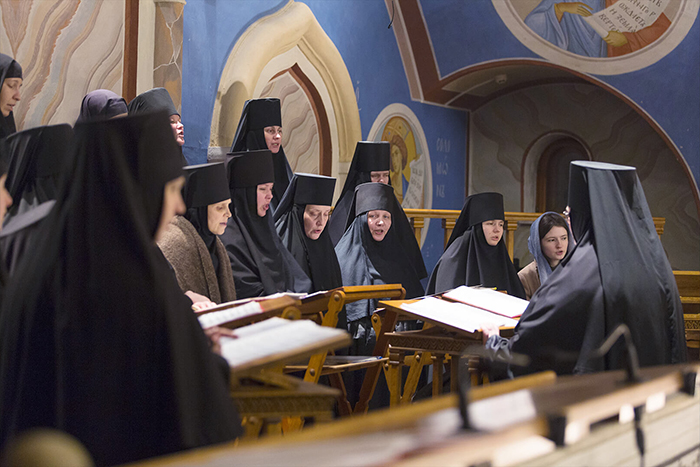
Why do we sing so much?
It’s hard to find anything in Orthodox worship which isn’t sung. This is because traditional Jewish services were (and are) sung.
The Apostles were Jewish, and that’s how they grew up worshipping, so naturally that’s how early Christians worshiped. Orthodox Byzantine chant must have developed out of Hebrew chant. (The notion that the early Christians had simple free-form services is made up out of “whole cloth”. Where does it say that in the Bible?) Orthodox worship was naturally simplified when services were held secretly during persecution, but as soon as Christians were free again they returned to normal.
So far as we know, no ancient religion had “simple said services”. It never occurred to anyone to just stand before God or the gods and talk as to an ordinary person. God is holy. God is wonderful. God is awesome. Music expresses the mystery, the wonder, the holy fear, the joy of being in his presence.
Maybe I shouldn’t add this, but I think it’s worth saying. Once I attended a contemporary “Bible church” service where the pastor delivered a superb sermon about the holiness of God – only to be followed by a sentimental “twang twang twang” guitar song. I wanted to cry out “Ichabod!”, “the glory has departed!” But I didn’t.
Here is a video about the significance of Orthodox Church music. It refers to Byzantine chant – which may seem strange to non-Orthodox, and maybe even to some Orthodox, as it did to me at the beginning, but now I love it. The video could just as easily be about Russian or Serbian or Romanian or some other Orthodox music. I just think this is a particularly good explanation. At the conclusion, use your return arrow above to get back to the Post.
https://www.goarch.org/-/why-do-we-sing-in-church-
In the Apostolic Church and up till at least the Fourth Century, the people did much of the singing. The parts of our Liturgy books which direct the “choir” to sing originally belonged to the people. This changed after the “establishment” of the Church, when music was allowed to develop and it became more complicated – it’s the nature of everything to get more complex as time goes on – but very hard for ordinary folks to sing, so the choir or cantors took over.
Much of Orthodox choir music is very lovely – as above which I think is the very best of it. Continue on to the next video – Saint Nektarios’ popular hymn which many Orthodox people love to sing. It troubles me in Greece when people now stand there totally silent during worship.
In recent times, the ancient tradition of congregational singing is being revived in some places, especially in the New World. Our late Antiochian Metropolitan Philip promoted it. We at Saint Nicholas, Cedarburg, followed his direction. Our people sing well, even some simple basic Byzantine chant. I think this is good: “How we worship is what we believe.” And so the teachings of the Church enter not only into our ears and souls but also into our minds – for if you sing something you easily remember the words.
Why only male clergy? Why only males in the Altar? *
- The “Altar” in Orthodox terminology means the entire area behind the iconostasis. The Holy Table itself is also often called the Altar. Is everything clear now?!
Should I get into this subject? Oh, why not? Nobody can shoot me through the computer. Were I in a Western denomination I would worry somebody might try, or send a hit man (hit woman?) after me! There people feel so very strongly about this issue. In the Episcopal Church we fought like cats and dogs about it, before “we” lost. Roman Catholics are still divided about it, with many clergy and laypeople all for it, and Pope Francis sounds as if he might like to be, but dare not.
So I was amazed that women’s ordination doesn’t seem to be an issue in the Orthodox Church. Or maybe people just don’t try because they know nothing ever changes here?! Anyway in thirty years I had two people ask me about it. In both cases I gave a very inadequate answer, and they said, Oh, I understand, and that was the end of that. (But I don’t understand…!)
Not many years after I became Orthodox, I was our Milwaukee clergy fellowship’s “chaplain” to the Milwaukee Orthodox Christian Women’s Association’s board. Their leaders were, I think, the most competent, organized, intelligent, “put together” group of people I have ever dealt with. At that time, our Metropolitan had just (wickedly!) appointed me to represent him at the national Convention of the Episcopal Church, and I knew I would be asked why we Orthodox chauvinist pigs oppress women. So I asked the OCWA board if women’s ordination was an issue with them. Almost before I could get the words out of my mouth, I heard a resounding “No!” Rather taken aback, I asked why not. They said, variously: Why would we want that? It’s against the Tradition. But we already run the Church!
But Why?
Why is this not an issue in Orthodoxy?
Is there a canon law forbidding it? Not that I know of. (Correct me if I’m wrong. But in any event, Orthodox don’t pay much attention to canon law.) The Orthodox Church does not have a clear theology about it. Like many things Orthodox, it just “is”, and continues without controversy – even among our people who in other respects are political and social liberals. (Shall I tell you that includes me? No.) This is one of the many ways we Orthodox remain about as counter-cultural as can be – in all directions.
A book by Father Thomas Hopko (of blessed memory),  Women and the Priesthood, published in 1983 but recently re-issued, is enlightening on the subject but not definitive. One point he makes is that ordination in the West seems to be mostly a “power” issue. In the East, it’s not. Explain that as you will.
Women and the Priesthood, published in 1983 but recently re-issued, is enlightening on the subject but not definitive. One point he makes is that ordination in the West seems to be mostly a “power” issue. In the East, it’s not. Explain that as you will.
… … OK. If you won’t try to explain it, I’ll take a couple of guesses.
Why is women’s ordination not a “power” issue here?
1 Maybe it’s because our bishops don’t need much of a top-down authority/power structure. They certainly have the authority to step in when parishes have major problems or when priests go off a deep end. But the decisions of Orthodox bishops in council are accepted only if the people agree. We’ve had plenty of councils which Orthodox people rejected. Our bishops and priests don’t rule in an authoritarian way – and those who try to do so are laughed at and/or ignored. This is very unlike Roman Catholics and even Anglicans. When I was Episcopalian, it was taken for granted that when some measure was passed at the national General Convention, that was that! so obey it.
Nor do Orthodox people need to be bullied by the clergy into believing the Faith, because we all agree about that – no problem. Let me tell you (for the third time?) my favorite story of the time when the Church of England had just ordained as bishop a man who had denied the Virgin Birth, the Resurrection and God only knows what all else. A C of E layman asked a visitor from Orthodox Eastern Europe whether this could happen in his country. The Orthodox man said “No”. The Anglican asked, “Why not?”, wondering what sort of ecclesiastical court system or whatever would deal with it. The Orthodox visitor said, “In my country, if a bishop denied the Resurrection, the people would take him and throw him in the river.” (That’s why I take particular care not to go heretical during Wisconsin winter.)
Here, I think, is an outward sign of the Orthodox “way”:  In the Divine Liturgy the Orthodox priest stands most of the time with his back to his people, with them as Christ was, facing towards the Father. While in the Western Mass or Eucharistic service, the priest now stands facing the people, looking like he’s with God, not with them. I know that wasn’t the intention of the new Mass,
In the Divine Liturgy the Orthodox priest stands most of the time with his back to his people, with them as Christ was, facing towards the Father. While in the Western Mass or Eucharistic service, the priest now stands facing the people, looking like he’s with God, not with them. I know that wasn’t the intention of the new Mass,  but really, doesn’t it “come off” that way? While I was an Episcopalian priest, one Sunday right in the middle of Mass I suddenly thought “What ever am I doing back here?” and never celebrated Mass facing the people again.
but really, doesn’t it “come off” that way? While I was an Episcopalian priest, one Sunday right in the middle of Mass I suddenly thought “What ever am I doing back here?” and never celebrated Mass facing the people again.
2 There is also the argument that because Christ was (and is) male, priests serving as his “icons” at the Divine Liturgy must also be male. I think there may be something to that. But all Christians are icons of Christ. He lives in all of us. All of us present him to the world. So I’m not quite convinced by this. I’ll welcome any comments on this explanation.
3 I have another unformed thought: Over my 54 years as a pastor (there and here) I believe that on the whole women are better pastors than men – with many exceptions, of course. Women have many and great gifts, and I dearly wish the Orthodox Church would make more use of them. However I have also observed that when women are ordained as priests, theology tends to turn away from the supernatural revelation from on high in Jesus Christ, and moves towards natural earthly human reason and feeling. I think that deep down this has something to do with pagan sky gods and earth mothers, but I’m not sure quite what.
For a while the Episcopalian Cathedral of Saint John the Divine in New York had a “female” crucifix, “Christa”.  I’m sorry to show you this – I hope I don’t get kicked off Ancient Faith! but I think you really should see what’s going on, God help us all. As time went on some Episcopalians began to baptize “In the name of the [impersonal] Creator, Redeemer and Sanctifier” and a few even “In the Name of the Mother, the Daughter and the Spirit”! This is why my Antiochian Archdiocese has directed that when people come desiring Christmation into Orthodoxy, we should not automatically accept Baptisms from the Episcopal Church, and also from the United Church of Christ. In the preceding I don’t mean to pick on the Anglicans. It’s just that I knew them well for a quarter century. So in order to be fair, let me also mention that about twenty years ago some RC nuns in Milwaukee were actually worshiping the mother goddess.
I’m sorry to show you this – I hope I don’t get kicked off Ancient Faith! but I think you really should see what’s going on, God help us all. As time went on some Episcopalians began to baptize “In the name of the [impersonal] Creator, Redeemer and Sanctifier” and a few even “In the Name of the Mother, the Daughter and the Spirit”! This is why my Antiochian Archdiocese has directed that when people come desiring Christmation into Orthodoxy, we should not automatically accept Baptisms from the Episcopal Church, and also from the United Church of Christ. In the preceding I don’t mean to pick on the Anglicans. It’s just that I knew them well for a quarter century. So in order to be fair, let me also mention that about twenty years ago some RC nuns in Milwaukee were actually worshiping the mother goddess.
But to sum it all up: I don’t know why only male priests and bishops. If you do, I’d love to hear it in a comment below.
Male Acolytes
Acolytes are men and boys (“altar boys”) who assist at the Divine Liturgy.
We should note first that in New Testament times and later, the Church had Deaconesses who were “set apart” to minister to women in a society where men and women did not mix freely, certainly not alone. It seems very unlikely that they served in the Altar. Deaconessee officiated at women’s Baptisms, since those baptized were immersed naked (sorry, I’m not going to show you any more racy pictures) in “living water” – outdoors at Pascha – brrr! The order of Deaconesses is canonical and could be revived, if need be. I heard somewhere that Saint Nektarios the Wonderworker ordained a couple of Deaconesses. Does anybody know if it’s true?
But why only male acolytes and altar boys? Here, too, I have heard some explanations, but I don’t think they make much sense. However, I don’t  think it’s chauvinism, for women have been accepted without controversy in every other role in Orthodoxy, including Parish Councils or Boards – and chairing them.
think it’s chauvinism, for women have been accepted without controversy in every other role in Orthodoxy, including Parish Councils or Boards – and chairing them.
I have seen nuns assisting in the Altar at Liturgy, and girls as acolytes carrying candles, so long as it was outside the Altar area. All I know is that when I was a new Orthodox priest I once invited some women into the Altar to say the post-liturgical prayers as I consumed the Holy Gifts. They refused, horrified at the very idea! And so I learned “what was what”.
Actually nobody is allowed in the Altar without a blessing. And almost anybody can be allowed in on business, with a blessing. Once a guy  visiting from another parish came charging in without a blessing and began to talk with me while I was still consuming the Holy Gifts. I chased him out. He was upset. Good. He should have known better. He never came back to visit again. Tough.
visiting from another parish came charging in without a blessing and began to talk with me while I was still consuming the Holy Gifts. I chased him out. He was upset. Good. He should have known better. He never came back to visit again. Tough.
Many people today have absolutely have no appreciation of “holy places”. I once hired a repair man to do something necessary in the Altar, gave him a blessing, and before I knew. he had put his tool box on the Holy Table! What has gone wrong in our society? Have people lost all sense of propriety, of the holy? I was gentle with him, simply explaining that we Orthodox don’t do that. But still…
So in all the above have I really explained anything? Again, no. Like many things Orthodox, they are as they are because that’s the way they are. “It’s a mystery!” At least to me.
However, and this is important, something has kept the Orthodox Church completely solid in the Faith for all these centuries, while everybody else seems to be slithering around. Whatever our “system”, let’s not mess around with it.
Why no pipe organs in Orthodox churches?
Actually, I have seen a couple of Orthodox churches with little Hammond organs, about which the less said the better. Their purpose is to support the choir in singing multi-part harmony. I don’t think choirs need it. And it’s certainly not much help with traditional Orthodox music, whether Byzantine or the more modern Russian. They had simple pipe organs in ancient Greece, but they were never used in Orthodox church. In the West they soon were used in worship.
Let’s ask it positively: Why only a cappella singing in the Orthodox Church? My theory is that this reflects the Orthodox understanding of Church authority. (Who would have guessed?) In Western Christianity, the Faith is generally “imposed” externally – whether from the Papacy or from the Scriptures – and is something to be obeyed and followed. In the East the Holy Spirit dwells within each of us Acts 1:14-17 so there is no need for the Faith to be imposed from outside.
So it is natural in the West to sing following an external “control”, the organ.
While we Orthodox naturally sing a cappella, from within us, all of us “tuning” to each other. This is the only explanation I can imagine.



